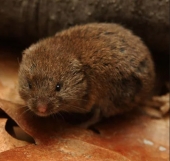We have lived in places where the voles were horrendously damaging to trees and root crops. Of 3000 pounds of carrots ,beets and potatoes , every fall about 1/2 of them had been eaten on, which meant they would not store through the winter in the root cellar. They were one of the catalysts for moving from that homestead and when we packed up our belongings in boxes, I made sure every box was taped securely shut so that we would not introduce any hitchhikers to the vole-free land we were moving to.
Guess what? 5 years later, the voles have arrived. I think someone must have inadvertently brought them here. Argh. They've really been doing a number on my greenhouse greens the last couple of winters.
The best way of trapping them I learned from Eliot Coleman of the 'Four Season Harvest ' book fame. He gets the Best Mouse Trap, and hides them just inside the hole he cuts into an old fishing tackle box or homemade wooden box of the same size. The voles like to go inside dark boxes and the trap gets them as soon as they enter. It seems to be a more effective method than having traps out in the open.
https://growingformarket.com/articles/trap-boxes-the-scourge-winter-growing-voles






